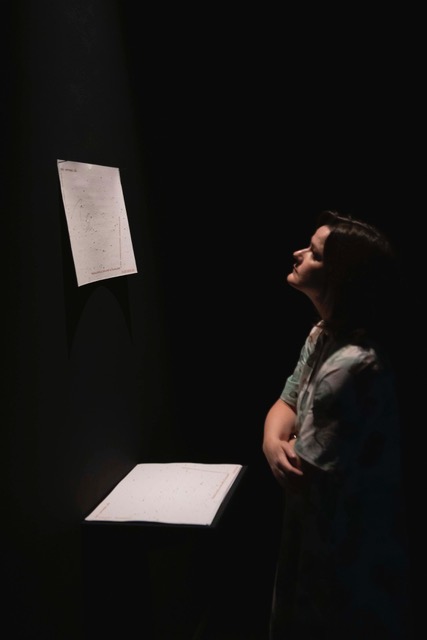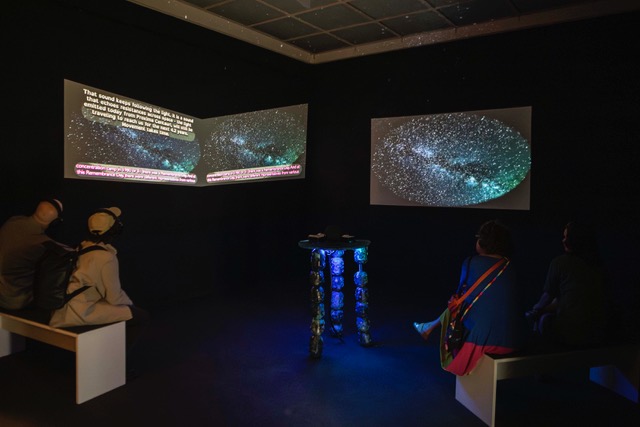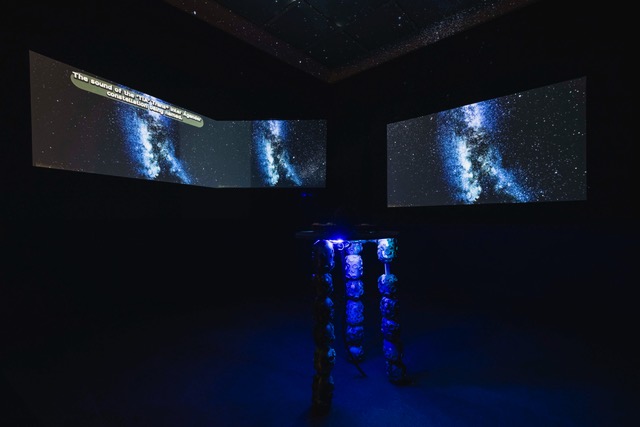Coalition Constellation: Constellating Reparations // Ren Loren Britton

Coalition Constellation: Constellating Reparations
ReWilding Mobility Grant Report
by Ren Loren Britton
For the awarded Re:Wilding Mobility Grant I have used the grant in a few different ways to produce a new work, Coalition Constellation: Constellating Reparations currently on view in Innsbruck, Austria at the Kunstpavillion.
Coalition Constellation: Constellating Reparations, is a multisensory work telling stories about affirmative, collaborative practices of social justice. These are historical and contemporary examples of collective self-empowerment that have led to success over time as a result of sustainable coalitions between disabled people, trans* people, those affected by racism, and other oppressed groups.
This investigation is directed against the observable negativity in our present society and moves toward a ‘we’ that is is complex and maintains a multitude of goals, practices, collectives, and oppositions, while still making political change possible, as Femke Snelting writes. By collecting events that went well for and between oppressed groups—especially when living conditions were previously very dire—this work, part of a bigger research project on ‘Coalition Storytelling’ develops collaborative storytelling practices that aim to inspire our collective political imaginations.

The starting point for this installation is a story by Udo Sierck, one of the main organizers of the Krüppelzeitung (Crip Newspaper), which published and discussed the everyday experiences and resistance of disabled people in magazine format in Bremen, Germany from the late 1970s to the mid-1980s. In the work, visitors learn details of this story detailing successful efforts to obtain reparations for those who were killed during the Nazi era in Germany. The work narratively reconstructs this process and reflects on the exemplary nature of this undertaking, working in coalition and questioning how and why and with what conditions those of us on the margins may feel and work for the ambivalences that come with pushing for change within legal infrastructures that never protected those on the margins in the first place.
Engaging with the trans*feminist tradition of renaming structures, the work looks up to the starry sky and asks what it would be like if we renamed the constellations we have known since ancient times, whose names have almost exclusively masculine or patriarchal connotations: to the constellation of reparations or restitution or collaboration? These questions are engaged in the installation in a three channel video work. Engaging the aesthetics of access, the work uses subtitles, audio descriptions, and access copies as formats that center disabled, non-normative and neurodivergent modes of perception. In the center of the room, there is a dreaming table, inspired by planetarium projection machines and on the wall a tactile star map, allowing visitors to feel the night sky over Innsbruck during the exhibition period. The map can be taken away by visitors to draw their own new constellations.
By focusing in the work on developing an aesthetics of access the mobility grant enabled me to further invest in access practices in three ways. Working with access centered practice is a part of the politics informing my artistic research practice meaning that I center my disabled and queer community in all the work that I do and work to ensure that the work itself is also accessible to be experienced also by my community. One was to create a tactile star map that makes all of the stars tactile and feel-able between June – September in the skies above Innsbruck, Austria. Making the stars tactile allows for a kind of embodied access for low vision, Blind and seeing people. These maps are available to be taken away by visitors to the exhibition.

Further in the exhibition there is a three channel video present. As part of the video I worked with Audio Description making the video work accessible for Deaf and Hard of Hearing visitors.
Thirdly I undertook an online course on Easy Language (Einfacher Sprache) on how to take difficultly worded texts and translate them into Easy Language. This creates access across Neurodivergence, those who are learning a language and for Intellectually Disabled people. This is a skill that I am still learning and its implementation is in development.
Ren Loren Britton is a trans*disciplinary artist-designer reverberating with trans*feminism, technosciences, radical pedagogy and disability justice. The hir-story of cyberfeminism informs their focus on trans*, as in, transgender and trans*, as in, crossing contexts with feminist concerns. They are interested in how socio-technical systems make lives accessible and pleasurable. Departing from the understanding that we live in a deeply ableist white supremacist world they follow justice oriented practices by rethinking and reenacting all terms of who and what fits (in on/offline spaces) with what friction (or not) and why. Disability justice emerges in their practice as a practice of upholding and valuing all non-normative bodies and minds. Ren holds a Master of Fine Arts from the Yale University School of Art and a Bachelor of Arts and of Fine Arts from Purchase College, US and lives in Berlin, Germany.
Rewilding Cultures (RC) is a Creative Europe collaboration project, which wants to reposition the wild within the field of art practices connecting to science and technology.
Rewilding Cultures Mobility Grant Report 2024 (Schmiede) – Miranda Moss at Home Made 2024
Rewilding Cultures at Schmiede24 by María Contreras
FeralAIRs (Rewilding Cultures) documentations
Rewilding Cultures is co-funded by the Creative Europe programme of the European Union, which aims to support European projects in the field of cultural production and innovation. The partner associations include ART2M / Makery (FR), Bioart Society (FI), The Culture Yard (DK) (DK), Cultivamos Cultura (PT), Ionian University (GR), Radiona (HR) Schmiede Hallein (AT) and Projekt Atol (SI) which leads the project. More information on the project available on the Rewilding Cultures website.
————
Schmiede26
September 16. – 26. 2026
Apply till May 31.
